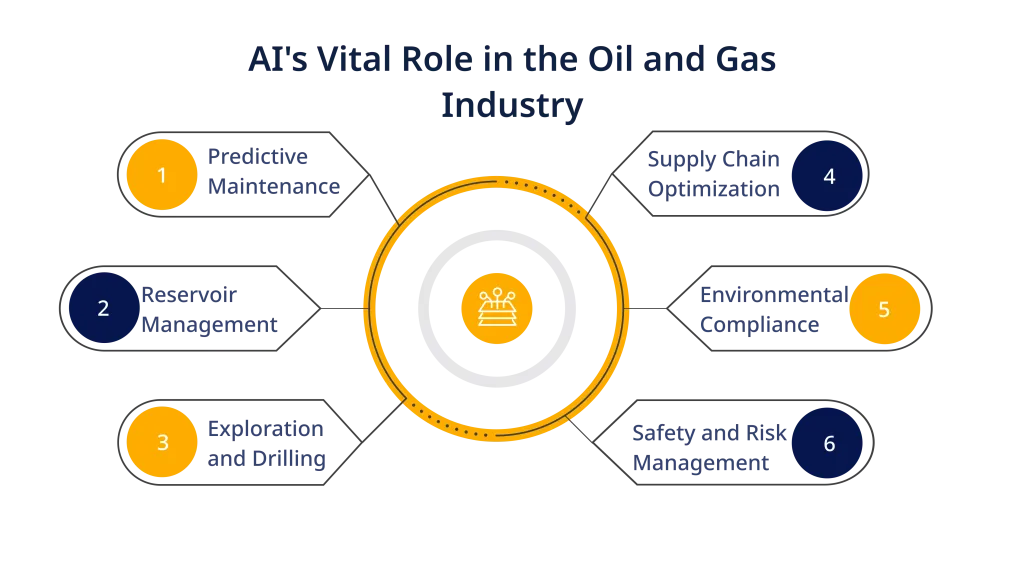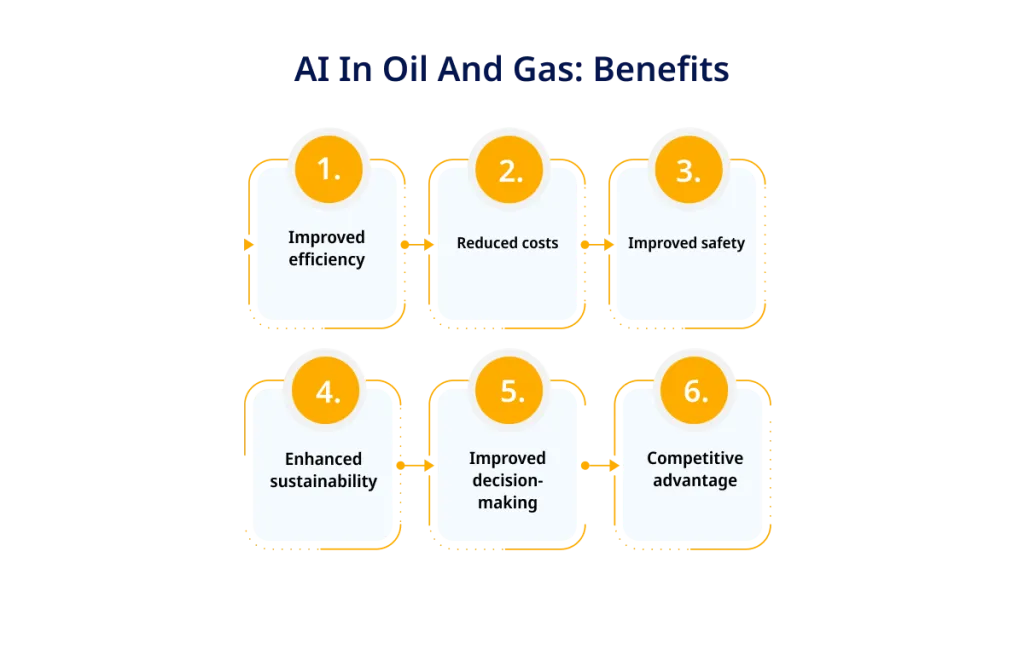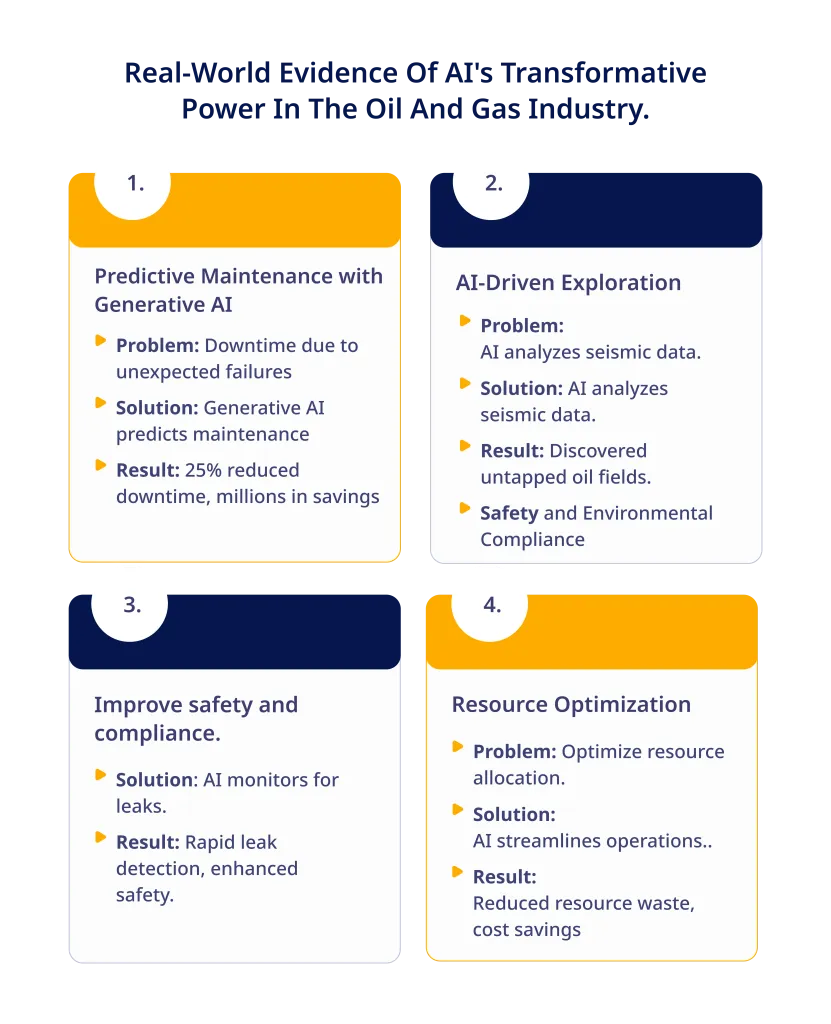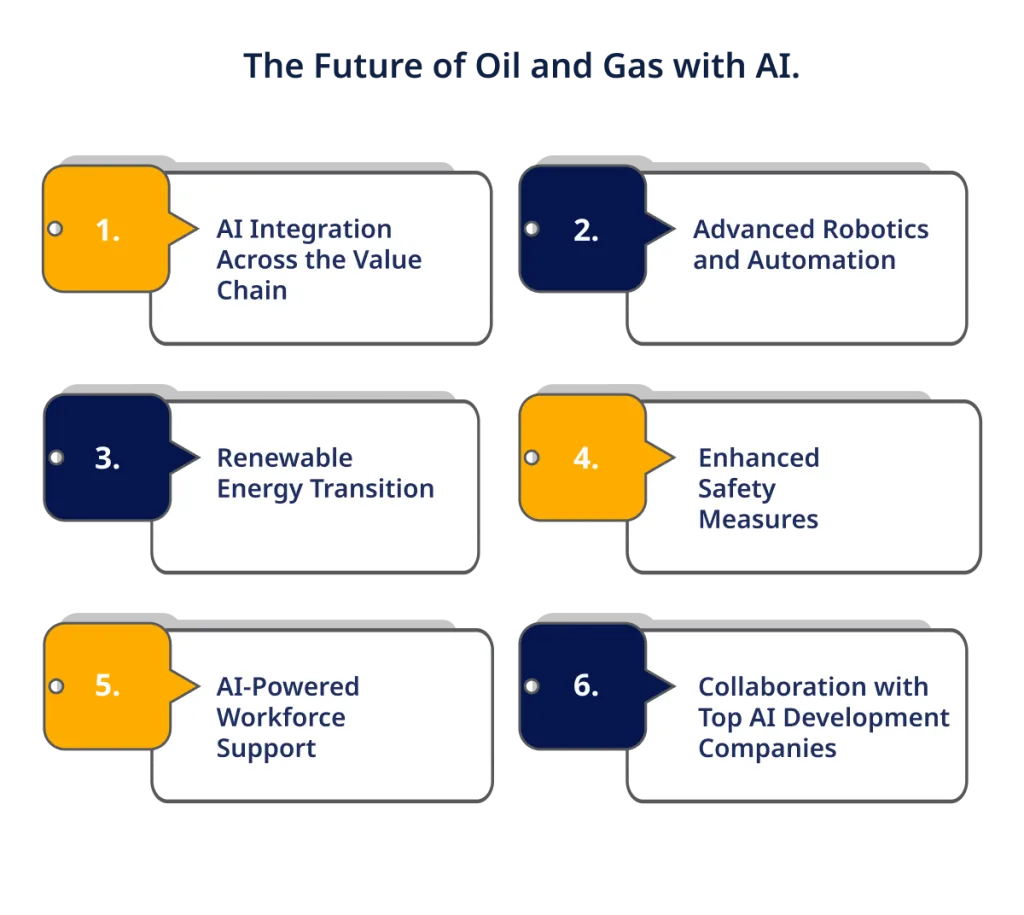Artificial Intelligence unlocks immense opportunities for oil and gas companies to drive efficiency, insights, sustainability, and performance.
Leading organizations already see over 10% reductions in costs and downtime by implementing AI solutions for the oil and gas industry, spanning predictive maintenance, computer vision inspection, supply chain optimization, and more.
But capitalizing on AI’s potential requires an enterprise-wide approach, not just isolated pilots.
With thoughtful planning, investment, and partnerships, companies can steadily scale AI across operations.
The future shines bright as neural networks and computing power advance – opening new use cases and possibilities.
The message is clear – AI is now an indispensable tool for the oil and gas sector to gain a competitive advantage, just as it revolutionizes manufacturing and other industries.
Seize this moment to propel your organization forward with strategic implementations of AI in oil and gas.
The era of data-driven energy transformation is here.
Understanding the Role of AI in the Oil and Gas Industry
Artificial Intelligence (AI) is like a super-smart assistant for oil and gas companies, offering high-tech solutions to their challenges.

It’s not just about robots taking over, but more like AI systems working alongside humans to improve things.
What AI Does for Oil and Gas?
Here are some of the key points that you must know about what AI does for Oil and Gas:
Predictive Maintenance: AI keeps a vigilant eye on machinery. It spots when things might go wrong, preventing unexpected breakdowns.
Data Crunching: AI loves data. It gathers and analyzes data faster than any human can. This helps in making smarter decisions.
Safety Assurance: It’s all about safety. AI ensures that operations are safe by detecting potential hazards and warning early.
Environmental Friendliness: AI helps in reducing environmental impacts. It’s like a superhero for the planet, detecting and preventing leaks or emissions.
How Does AI Work?
AI in the oil and gas industry relies heavily on IT solutions. It’s like fitting a smart brain into the company’s operations. Here’s how:
Data Collection: AI collects data from sensors, drones, and other sources.
Data Analysis: It crunches numbers to find patterns and trends.
Predictive Analytics: It predicts when equipment might need maintenance and optimizes resources.
Safety Checks: AI keeps a watchful eye on safety measures and alerts when something’s not right.
AI in oil and gas isn’t just a fancy concept; it’s a practical way to make things safer, more efficient, and environmentally responsible.
To know more on how AI development solutions can boost your business, read our detailed web blog on ‘AI-Powered Future: Revolutionizing Businesses With Tools Like ChatGPT’
Challenges in the Oil and Gas Industry
The oil and gas industry, a massive global energy powerhouse, faces several pressing challenges.
While AI development services offer solutions, it’s crucial to understand these industry hurdles:
1. Cost Management and Operational Efficiency
Oil Price Volatility: The industry is subject to unpredictable oil price fluctuations, impacting profitability.
Rising Costs: Exploration and extraction costs have surged, making profitability a tough nut to crack.
2. Safety and Risk Mitigation
Workplace Hazards: Oil and gas operations are inherently risky, demanding rigorous safety measures.
Environmental Risks: Spills, emissions, and accidents can harm the environment, requiring stringent compliance.
3. Environmental Regulations and Sustainability
Regulatory Compliance: Stricter environmental regulations necessitate rigorous monitoring and reporting.
Sustainability: Reducing carbon footprint and emissions is an industry-wide goal for a greener future.
4. Aging Infrastructure and Asset Management
Asset Health: Maintaining and upgrading ageing infrastructure to ensure smooth operations.
Optimizing Resources: Efficiently managing assets and minimizing downtime.
5. Workforce Productivity and Skill Shortages
Knowledge Gap: An ageing workforce and a shortage of skilled personnel pose a significant challenge.
Knowledge Transfer: AI for the manufacturing industry can ensure knowledge transfer to the new generation, essential for operational continuity.
In these challenges, the power of AI in the oil and gas sector shines. It offers predictive maintenance, safety monitoring, and data-driven decision-making to combat these issues effectively.
How AI Addresses These Challenges
AI for oil and gas industry is dependable in the oil and gas industry, offering tailor-made solutions to conquer the obstacles it faces.

Let’s explore how AI steps up to the plate:
1. Cost Management and Operational Efficiency
Predictive Maintenance: AI keeps a watchful eye on machinery health, foreseeing issues before they disrupt operations and saving on costly downtime.
Resource Optimization: By analyzing data, AI helps optimize resources, reducing wastage and enhancing operational efficiency.
2. Safety and Risk Mitigation
Early Warning Systems: AI deploys sensors and algorithms to detect potential hazards, providing early warnings to prevent accidents.
Environmental Monitoring: AI constantly monitors for leaks or emissions, ensuring safety and compliance with environmental standards.
3. Environmental Regulations and Sustainability
Regulatory Compliance: AI continuously monitors and reports that operations adhere to environmental regulations.
Sustainability Initiatives: AI helps reduce the environmental footprint by detecting and preventing mishaps.
4. Aging Infrastructure and Asset Management
Predictive Analytics: AI predicts when equipment might need maintenance, preventing unexpected breakdowns and extending asset lifespan.
Efficient Asset Management: AI systems assist in resource allocation, minimizing costs and downtime while ensuring assets are in tip-top shape.
5. Workforce Productivity and Skill Shortages
Knowledge Transfer: AI acts as a knowledge repository, making accessing essential information easier for less experienced personnel.
Training and Support: Oil and gas companies can hire AI engineers to develop AI-powered training programs, assisting in upskilling the workforce.
AI offers a powerful antidote to these challenges in the oil and gas sector. It’s like having a dedicated team of experts working 24/7 to ensure operations run smoothly and safely.
Benefits of AI Adoption
Artificial Intelligence in the oil and gas industry isn’t just a buzzword; it’s a game-changer.

Let’s break down the real-world benefits it brings:
1. Cost Reduction
Predictive Maintenance: AI’s ability to predict when equipment needs maintenance minimizes costly downtime.
Resource Optimization: It helps in efficient resource allocation, reducing operational expenses.
2. Increased Efficiency
Data-Driven Decision Making: AI processes vast datasets swiftly, aiding better decision-making.
Operational Streamlining: It optimizes processes, making operations smoother and more efficient.
3. Improved Safety and Risk Management
Early Warning Systems: AI detects potential hazards in real-time, ensuring safer operations.
Environmental Compliance: It prevents environmental risks, keeping the company in line with regulations.
4. Environmental Sustainability
Reduced Carbon Footprint: AI helps in reducing emissions and environmental impact.
Leak Detection: It identifies and prevents leakages in pipelines and other facilities.
5. Enhanced Decision-Making
Data Analytics: AI provides valuable insights, aiding in well-informed decisions.
Strategic Planning: It enables long-term planning and investment strategies.
Partnering with top AI development companies ensures that these benefits are harnessed effectively.
AI isn’t just a cost-saving tool; it’s a pathway to a safer, more efficient, and environmentally conscious future in the oil and gas industry.
Case Studies and Real-World Examples
Real-world case studies in the oil and gas industry reveal the incredible impact of AI. Here are some noteworthy examples:

1. Predictive Maintenance with Generative AI Services
Problem: A major oil company faced significant downtime due to unexpected equipment failures.
Solution: They implemented generative AI services to predict maintenance needs.
Result: Downtime reduced by 25%, saving millions in maintenance and operational costs.
2. AI-Driven Exploration
Problem: A global exploration and production company needed to locate new reserves.
Solution: AI algorithms analyzed seismic data to pinpoint potential reserves.
Result: They discovered previously untapped oil fields, increasing their production capacity.
3. Safety and Environmental Compliance
Problem: A pipeline operator sought to improve safety and environmental compliance.
Solution: AI systems continuously monitor pipelines for leaks and anomalies.
Result: Rapid detection of leaks and early warnings improved safety and reduced environmental risks.
4. Resource Optimization
Problem: An oil rig operator needed to optimize resource allocation.
Solution: AI analyzed real-time data to streamline operations.
Result: Reduced resource waste and improved operational efficiency, leading to substantial cost savings.
These case studies underscore the practical application of AI for the oil and gas market, showcasing how top AI development companies leverage AI to address challenges effectively.
AI isn’t just a concept; it’s a proven solution transforming the industry and making operations safer, more efficient, and environmentally responsible.
Looking to the Future
As we peer into the horizon of the oil and gas industry, it’s evident that AI is here to stay, and its transformative power will only grow stronger.

The future holds exciting prospects as the industry continues to embrace AI innovations. Here’s what we can expect:
1. AI Integration Across the Value Chain
Data-Driven Decision-Making: AI will become central to strategic decision-making, from exploration to refining and distribution.
Supply Chain Optimization: Further optimization of the supply chain, reducing inefficiencies and costs.
2. Advanced Robotics and Automation
Robotic Drilling: Advanced AI-powered robots will take on dangerous and repetitive tasks on offshore rigs, enhancing safety.
Automation in Refineries: Smart automation systems will oversee the refining process, increasing efficiency.
3. Renewable Energy and Sustainability
Transition to Renewable Sources: AI will assist in transitioning to renewable energy sources, reducing the environmental impact.
Carbon Capture and Storage: AI will play a key role in carbon capture and storage solutions, addressing emissions.
4. Enhanced Safety Measures
Predictive Safety: AI will predict potential safety issues, enhancing the overall safety of rigs and pipelines.
Emergency Response: AI-powered systems will improve response times during emergencies.
5. AI-Powered Workforce Support
AI-Driven Training Programs: Oil and gas companies will increasingly hire AI engineers to develop training programs for their workforce.
Knowledge Transfer: AI will facilitate knowledge transfer from experienced professionals to new recruits.
6. Collaboration with Top AI Development Companies
Strategic Partnerships: Oil and gas companies will form strategic partnerships with top AI development companies to ensure the adoption of cutting-edge AI solutions.
Custom AI Services: Custom AI solutions will be developed to address specific challenges in the industry, like generative AI services for equipment design and optimization.
The future of AI in the oil and gas industry is marked by increased efficiency, sustainability, and safety.
As top AI development companies continue to innovate, the industry will harness the power of AI for a more environmentally responsible, cost-effective, and secure future.
By embracing AI, the sector is poised to tackle challenges with ingenuity and thrive in a changing world.
Conclusion
As we have explored, AI in the oil and gas industry has brought significant transformations.
From predictive analytics to computer vision to natural language processing, AI unlocks new levels of insight, automation, and optimization across the value chain.
Leading energy companies are already realizing measurable benefits – reduced exploration costs through advanced seismic data analysis, improved asset uptime via predictive maintenance, superior customer experiences through virtual assistants, and more.
The numbers don’t lie.
But to tap AI’s full potential requires embracing it as an enterprise-wide initiative, which is possible with the support of IT solutions for Oil and Gas companies.
A cohesive data strategy, change management game plan, and governance frameworks are crucial.
A crawl-walk-run roadmap allows AI solutions for the oil and gas industry to be steadily scaled over time.
The future for AI in oil and gas shines bright. With continuous improvements in neural networks and computing power, applications will only expand.
This new competitive arena demands companies implement IT solutions that incorporate AI in oil and gas to get up to speed quickly on what’s newly possible.
Now is the time to chart your organization’s AI journey – identify high-potential use cases, run controlled experiments, measure impact, and iterate.
Partners with energy domain expertise can help you explore possibilities while mitigating risks.
One thing is clear – AI is no longer a novelty in oil and gas but rather an indispensable tool for uncovering value across the sector. The era of AI-powered energy transformation has arrived.


